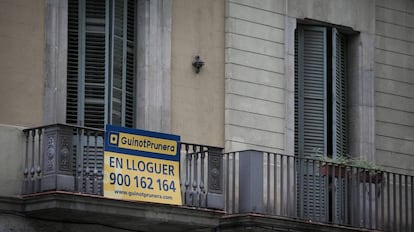Spain’s new real estate boom: the rental market
Monthly prices on new leases rose 20.9% on average over the last year, says industry leader Idealista
The Spanish real estate market is experiencing a new boom, this time in the rental sector. The average rent for new leases has risen 20.9% over the last year, according to leading industry website Idealista. And cities like Madrid and Barcelona saw record average prices.

This is due to a rise in demand, but also to a drop in supply. That is because many homeowners who had been renting out their properties during the economic slump are now putting them back on the sales market as prices start to pick up again. Added to this is the fact that short-term rentals to tourists has become a more profitable proposition than long-term leases.
All of which is making life more complicated for regular renters.
Alicia, 26, lives in Barcelona and works in customer service at a local company. She had been sharing apartments for the last 10 years, but in February of this year she and her boyfriend decided to move in together. So they started to search for rental homes.
According to real estate groups, the biggest impact is caused by the thousands of homes sitting empty that are not on the market
“The situation I found is depressing,” she explains, listing the horrors that she has seen during her search.
“We went to see a small apartment because we thought the price was good,” she recalls. The owner wanted €550 a month for all of 30 square meters in a seventh-floor walk-up in the Born neighborhood. “It was a converted dovecote [where pigeons were once kept]. The bathroom was a closet. Everything was old. And even so, there were 20 people in line waiting to view it.”
The months went by. The best-maintained, more spacious places all went for €900 and up. The couple eventually found a place in June.
“It’s in the Raval. It’s a sixth-floor walk-up. Some friends of ours who were staying there decided to move out, and they recommended us to the owner, who’s kept the rent at €560. But we’ve had to offer a bank guarantee, pay insurance and hand over one month’s deposit. And the landlord has warned us that he will not fix anything that gets broken,” says Alicia. “Even so, I think we got really lucky.”

But some of her friends are leaving Barcelona, saying they are being priced out.
According to Idealista’s figures, there are six cities in Spain where rent is higher than it was a decade ago: Barcelona, Las Palmas, Palma, Madrid, San Sebastián and Girona. The National Statistics Institute (INE) offers more dramatic numbers: rent levels in 48 provinces are higher than in May 2007. In the 10 most populated provinces, accumulated rent inflation since 2007 is between 5% and 15%.
A study by the University of Barcelona predicts that rent will continue to rise this year at an average rate of 8% in Barcelona and 13% to 14% in Madrid. The study’s author, economics professor Gonzalo Bernardos, explains that during the crisis, the slump in property prices made many owners decide to rent out their properties instead. Between 2007 and 2013, supply grew 65%. But that trend is being reversed now.
“Out of every 10 rental leases that expired last year, six of those properties are now being put up for sale,” he said.
“At play here is the psychological effect on many owners who did not want to sell their properties for less than what they paid for them,” adds José García-Montalvo, who teaches applied economics at Pompeu Fabra University. “In Barcelona there are neighborhoods where prices are back to pre-crisis levels, and so owners would rather sell than keep renting them out. And that drives supply down.”
And while supply is dropping, demand keeps rising. “There’s been a psychological change in many people, who no longer feel that renting is tantamount to throwing away your money,” he adds, citing a long-held belief in Spanish society, where home ownership rates remain very high.
Some people are renting out of need, as banks continue to be strict about mortgage eligibility following the real estate debacle that left the sector with scores of repossessed properties on their books.
Holiday rentals
Meanwhile, vacation rentals are an added element in the equation. While it is unclear how much of an impact short-term tourist accommodation really has on the rental market, a study commissioned by the city of Barcelona shows that these properties represent 7.7% of the city’s entire rental home supply, and says that they do have an effect on prices.
But business associations and real estate groups deny this impact, and note that the areas where rent has risen the most are not those with the highest number of short-term tourist lodgings. According to these groups, the biggest impact is caused by the thousands of homes sitting empty that are not on the market.
But a survey of homeowners conducted by property listing website Fotocasa shows that 74% of owners who rented out their place to tourists reported making more money than if they had rented out to long-term tenants.
The key, says another study by the rental company Alquiler Seguro, lies in the number of days that the housing unit is occupied. In Madrid, for instance, a vacation rental would require average occupancy of 15 to 18 nights a month to be as profitable as a long-term lease. In Barcelona, this drops to between 12 and 15 nights a month.
English version by Susana Urra.
Tu suscripción se está usando en otro dispositivo
¿Quieres añadir otro usuario a tu suscripción?
Si continúas leyendo en este dispositivo, no se podrá leer en el otro.
FlechaTu suscripción se está usando en otro dispositivo y solo puedes acceder a EL PAÍS desde un dispositivo a la vez.
Si quieres compartir tu cuenta, cambia tu suscripción a la modalidad Premium, así podrás añadir otro usuario. Cada uno accederá con su propia cuenta de email, lo que os permitirá personalizar vuestra experiencia en EL PAÍS.
¿Tienes una suscripción de empresa? Accede aquí para contratar más cuentas.
En el caso de no saber quién está usando tu cuenta, te recomendamos cambiar tu contraseña aquí.
Si decides continuar compartiendo tu cuenta, este mensaje se mostrará en tu dispositivo y en el de la otra persona que está usando tu cuenta de forma indefinida, afectando a tu experiencia de lectura. Puedes consultar aquí los términos y condiciones de la suscripción digital.








































